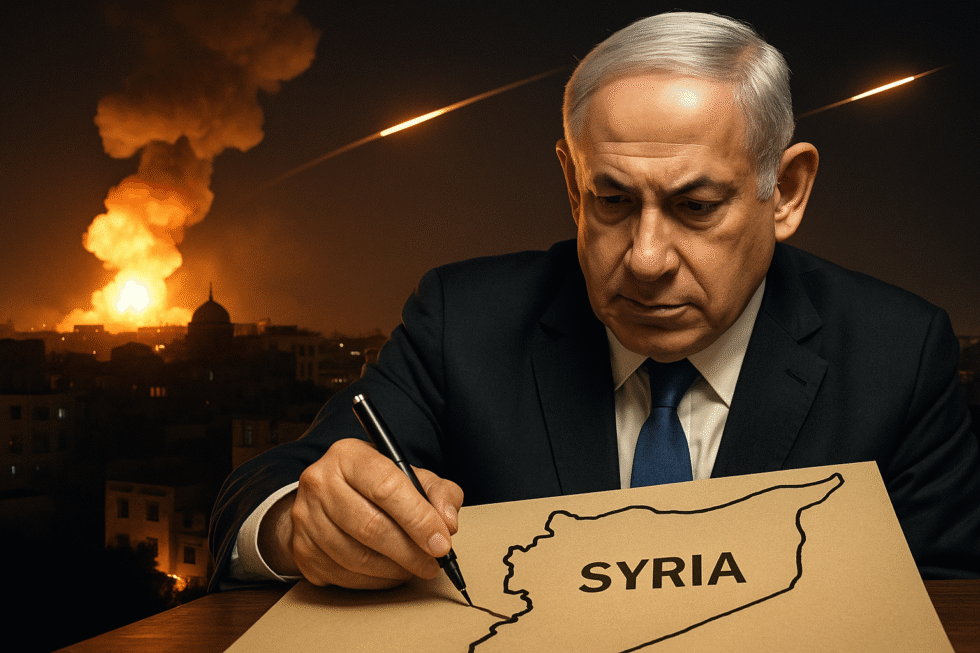5 Paths to Power: How Israel is Rewriting Syria’s Map

On July 16, Israel struck the Syrian military headquarters and areas near the presidential palace in Damascus amidst internal fighting in the southern district of Suwayda.
The Druze community in Suwayda has recently faced persecution and violent discrimination by Bedouin groups loyal to the new government. The sectarian violence resulted in armed clashes between loose Druze militias and Bedouin tribes.
Israeli Prime Minister Benjamin Netanyahu has exploited, on several occasions, the persecution of minorities to advance Zionist control in the territory, framing Israel as the protector of Druze in Syria.
Days earlier, in the late hours of July 3, Israeli forces raided the Yaafour area near Damascus with armed vehicles and three helicopters. Israeli troops forcibly entered the Saysoun and Rakhlah villages through ground incursions, probing the former military’s Republican Guard.
The fall of the Assad government has been followed by escalated Zionist expansion into Syrian territories. Syria’s geoeconomic position serves as a strategic location for the Zionist colonial agenda.
Five strategies employed by Zionist forces can be identified, waged in an attempt to bolster Zionist dominance in the region.
1. Direct Military Occupation
According to Al-Akhbar newspaper, Israel has constructed a new base in the Quneitra governorate on al-Ahmar Hill, southern Syria.
Following the collapse of the Assad government, seven Israeli military sites were established in the occupied Golan Heights’ buffer zone. Two additional ones were set along Mount Hermon. The 890th Israeli Battalion has seized some of the former army’s infrastructure in establishing its stations. The new Quneitra base is merely an addition, not the first.
The annexation of the Golan Heights by Israel in 1967–81 is evidently expanding.
Syrian Minister of Foreign Affairs Asaad al-Shaibani has expressed, in response, Syria’s “aspiration to cooperate with the United States to return to the 1974 disengagement agreement.”
The agreement had legislated a buffer zone in the Golan to the east of the Israeli-occupied region, separating it from Syrian-controlled territory. Reports on Jolani’s position remain inconsistent.
While some have indicated Syrian demands for one-third of the Golan Heights back, others indicate no insistence on the Golan territories, focusing instead on recognition of the new regime as sovereign.
2. Demilitarization
Israel’s new era of foreign policy focuses on bombarding targeted nations with attacks while demilitarizing their armed forces. Since the regime takeover, Israel has launched hundreds of airstrikes in addition to its ground expansion beyond the occupied Golan.
As of June 2025, according to a report by Al Jazeera, Deraa has been targeted with 57 recorded attacks on former regime military sites, Damascus with at least 49 on key logistics hubs, and Quneitra with at least 25 on radar and surveillance infrastructure. The occupation army claims that the aerial bombardment on military infrastructure is to prevent them from being reached by “unwanted” and “hostile” parties.
On other occasions, Benjamin Netanyahu has demanded the complete demilitarization of southern Syria from new regime forces. The attention on southern Syria is aimed at eliminating all possible armed threats northeast of occupied Palestine.
The focus is only primary, as the dismantling of the Syrian military is seen as a prerequisite for further occupation. The failure of the new regime to resist Zionist expansion reinforces Israeli domination in the region, solidifying its role in post-Assad Syria.
3. Alignment with Minorities
The persecution of minorities by government-aligned factions since last December has also raised questions about the new regime’s legitimacy.
The Military Operations Command (MOC), a loose coalition of Syrian militias led by HTS, has been complicit in sectarian massacres, along with incidents of cultural vandalism and intimidation. The violence has largely targeted Alawites, Christians, Shiites, and Druze in Latakia, Tartus, Hama, Daraa, and other governorates.
Israel has consequently aligned itself with minority groups, specifically the Druze. Netanyahu has openly used the targeting of Druze in the south as an excuse for airstrikes on Syrian infrastructure. Now, the attack on Damascus is merely an extension of this foreign policy.
Israel has also increased its provision of humanitarian aid to the Druze community after ongoing sectarian clashes. These initiatives prepare for greater territorial control in the south, where the Druze constitute an essential community presence.
By portraying itself as the protector of minorities, Israel commits to a strategy of divide and conquer — yet the sectarian clashes are a manifestation of the new state’s extremist legacy.
4. Imperial Diplomacy
Diplomatic relations between the new regime and the Zionist state have revolved around legitimizing Israel’s presence as Syria’s friendly neighbor.
In addition to Syria’s request for reimplementing the 1974 disengagement agreement, the two parties have been committed to normalization talks, consistent with Western-Zionist demands.
According to Israeli officials, Israel has been directly engaged in daily communication with Syria’s interim authorities, but the Syrian regime claims negotiations are indirect.
Imperial diplomacy aims to secure an empire’s control over other territories through the soft exercise of power. Normalization efforts seek to establish Israel as a legitimate state and extend its colonial power beyond Palestine.
5. Resource Exploitation
As a consequence of Israeli expansion in southern Syria during the post-Assad era, Israel’s exploitation of agricultural and water resources has intensified. Residents in the rural south are struggling to survive with limited access to their land’s resources.
Israel’s control over vital water dams and reservoirs has been accompanied by raids and arrests of farmers in the southern villages. During April 2025, 2,000 men from Nawa attempted to resist Israeli forces seizing the Jabliya Dam and Tel al-Jomaa, a primary source of drinking water for up to seven villages. They encountered Israeli drone strikes until they withdrew.
Another key water source is the al-Mantara Dam, which receives water networks from Mount Hermon and delivers water to eight other dams in Syria. Israel’s recent seizure of the dam threatens the villagers who depend on these stations for drinking and agricultural production.
The exploitation of existing resources and the prevention of future development projects is a silent yet devastating feature of the occupation. It mirrors the classical dynamics of colonial rule, where the systematic capitalization on indigenous resources transforms the colony into a source of raw material for the colonial power.
This phenomenon has grown in scale since the regime takeover, raising questions about the ability of the new regime to act as a caretaker amidst its lack of action.
Familiar Relations?
Israel’s colonial strategies in post-Assad Syria are a reminder of its interaction with Syrian rebels during the war. CIA records show that the U.S.-Israel alliance sponsored the armament and training of Jabhat al-Nusra, the leading rebel group that rebranded into Hay’at Tahrir al-Sham (HTS).
Attempts toward regime change in the Assadist era were indefinitely supported by imperialist nations. In addition to Israel’s endorsement of Obama’s pro-rebel foreign policy in Syria, the occupation forces had directly engaged in favor of the rebels by striking Hezbollah and IRGC bases in Syria.
These interactions signify deeper beneficiary relations between the new government of Syria and the Zionist entity — a relation built on manufacturing a common enemy.
Israel’s apparent antagonism toward the new regime with the attack on Damascus demonstrates its political strategy since the Syrian war. While it supported Syrian rebels against Assad and celebrated the latter’s fall, the Zionist entity cripples the new system and benefits from having a destabilized Syria on its borders.
Israel now aligns itself with the targeted minorities, despite having trained the terrorist factions of the same ideological extremism.
If you value our journalism…
TMJ News is committed to remaining an independent, reader-funded news platform. A small donation from our valuable readers like you keeps us running so that we can keep our reporting open to all! We’ve launched a fundraising campaign to raise the $10,000 we need to meet our publishing costs this year, and it’d mean the world to us if you’d make a monthly or one-time donation to help. If you value what we publish and agree that our world needs alternative voices like ours in the media, please give what you can today.















